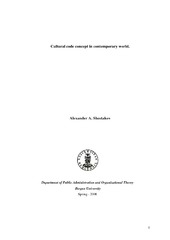Cultural code concept in contemporary world.
Master thesis
Permanent lenke
https://hdl.handle.net/1956/2861Utgivelsesdato
2008-05-30Metadata
Vis full innførselSamlinger
- Department of Government [473]
Sammendrag
Cultural code - a term, which describes a self-actualized human mentality - a unity of value orientations, socio-normative establishments (routines, rituals, heroes, symbols), fundamental features of characteristics specific to some nation, or human grouping. In scientific circles this term is introduced by a Russian philosopher K. M. Kantor. Ref: Kantor K. M., "History against progress", M., 1991. This research will attempt to reveal cultural code" parameters upon personal, group and international levels. De-coding is based upon analysis of contemporary theories comparison.The following objectives have been achieved in the research: conduct of the comparative analysis of contemporary theories in global cultural discourse; operationalization of empirical parameters of cultural code" in the changing system of global world's cultural discourse; an evaluation line for practical implementation of cultural concept in policy planning of affairs with culture involvement have been underlined; a scientific contribution to the social science research with intellectual investment in cultural theory.An empirical concept of cultural code" model has been operationalized upon three perceptional levels in order to perceive modern social reality better and in pursuit of a higher explanatory power. A structure of cultural code" was presented as a scheme upon personal, group and international levels.Finally, globalization tendencies have been underlined, as they do have reasonable effects upon cultures. It has been known that a universal cultural code" is desired, though the implementation of this project is an ambiguous task so far.
Utgiver
The University of BergenOpphavsrett
The authorCopyright the author. All rights reserved
